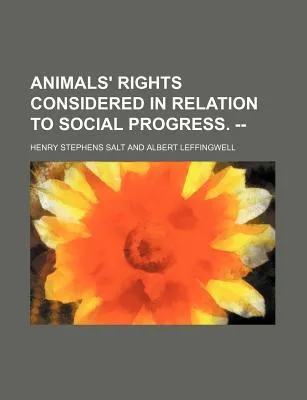Animals' Rights Considered in Relation to Social Progress. --
By (author): "Henry Stephens Salt"
Publish Date:
January 1st 1894

ISBN145881324X
ISBN139781458813244
AsinAnimals' Rights Considered in Relation to Social Progress. --
Purchase of this book includes free trial access to www.million-books.com where you can read more than a million books for free. This is an OCR edition with typos. Excerpt from book: CHAPTER III. THE CASE OF WILD ANIMALS. That wild animals, no less than domestic animals, have their rights, albeit of a less positive character and far less easy to define, is an essential point which follows directly from the acceptance of the general principle of a textit{jus animalium. It is of the utmost importance to emphasize the fact that, whatever the textit{legal fiction may have been, or may still be, the rights of animals are not textit{morally dependent on the so-called rights of property; it is not to owned animals merely that we must extend our sympathy and protection. The domination of property has left its trail indelibly on the records of this question. Until the passing of Martin's Act in 1822, the most atrocious cruelty, even to domestic animals, could only be punished where there was proved to be an infringement of the rights of ownership.1 This monstrous iniquity, so far as relates to the domestic animals, has now been removed; but the only direct legal protection yet accorded to wild animals (except in the Wild Birds' Protection Act of 1880) is that which prohibits their being baited or 1 See the excellent remarks on this subject in Mr. E. B. Nicholson's The Rights of an Animal (ch. III.). pitted in conflict; otherwise, it is open for anyone to kill or torture them with impunity, except where the sacred privileges of property are thereby offended. Everywhere, it has been well said, it is absolutely a capital crime to be an unowned creature. Yet surely an unowned creature has the same right as another to live his life unmolested and uninjured except when this is in some way inimical to human welfare. We are justified by the strongest of all instincts, that of self-defence, in safe-guarding ourselves against such a multiplication...